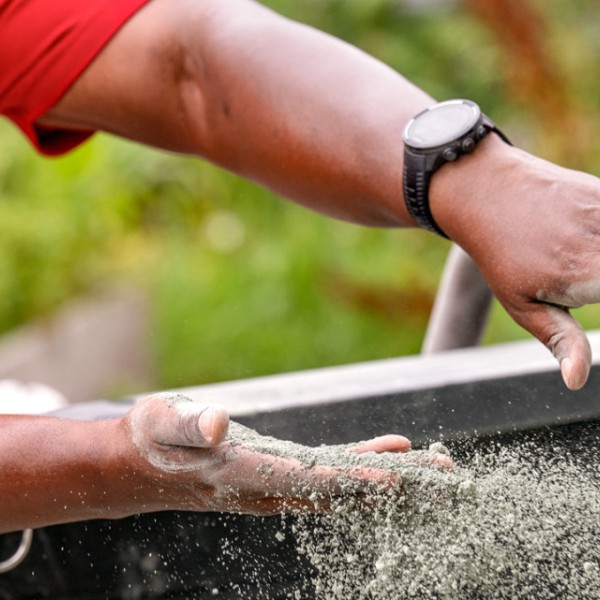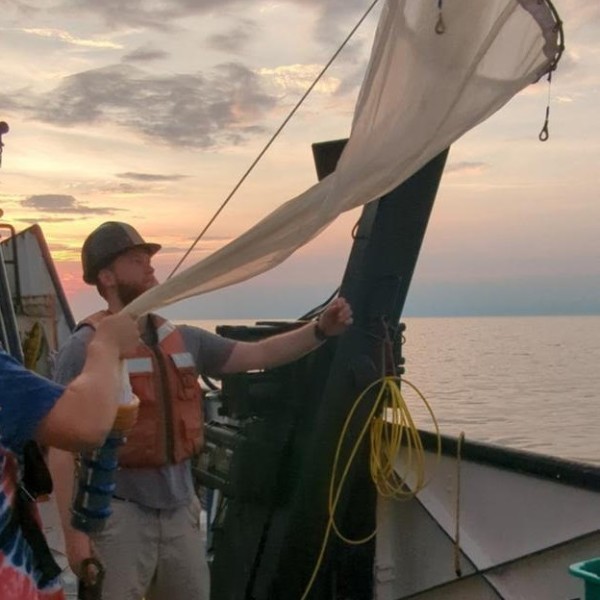Each summer, Cornell’s Nutrient Management Spear Program (NMSP) offers a variety of internships which provide experiences in the field and the lab. Interns are mentored by faculty, staff, graduate students, and professionals. We sat down with both interns and mentors to learn more about the projects and see how the mentorship program enriched their summer experiences. Watch the video below, or read on to learn more!
- Cornell Cooperative Extension
- Animal Science
- Statistics and Data Science
- Agriculture
- Field Crops
- Climate Change
- Environment
- Dairy
- Crops
- Soil
Quirine Ketterings, ANSCI Faculty member and NMSP Leader
Quirine Ketterings: This summer we had a group of interns with us here on campus, nine students altogether. We try to give them exposure to different aspects of agriculture by going to field days and farms and providing them opportunities to hear from farmers, crop advisors, and Cornell Cooperative Extension educators.

Sam Wallace, NCSU Bio & Ag Engineering ‘24 | Subha Srinivasagan, Postdoctoral Fellow with Cornell Atkinson Center for Sustainability
Sam: I was a precision agriculture intern this summer at NMSP. I worked on two primary projects both under the realm of remote sensing, so, I worked a lot with drone data collection. I would go out with Subha, my mentor, and we would fly a lot of fields in central New York. We were trying to get pictures from the air of these fields.

Subha: He’s really good with picking things up and he’s always so excited about things, which gets me excited too. We started off with some of the post-processing of the drone images that we’ve taken, and he’s taken complete hold of it.
Sam: I want to go into graduate school right after my senior year finishes up, so I think being able to work more around people who are in an academic research center is very helpful.

I really liked this research experience and I think building on that is something that I want to keep doing in the future.
Gretchen Wittmeyer, Cornell AgSci, ‘24 | Gurpreet Kaur, Animal Science Ph.D. student
Gurpreet: During the summer I worked with two interns; they both worked in the field and the lab with me. Gretchen worked on soil health and value of manure studies.

Gretchen: We had several field days of taking samples. Usually, it was a half an hour (or an hour) drive out to the field, and then a few hours of sampling.
Gurpreet: Gretchen, she’s been really supportive and very open to everything that we do. She could work on anything, but seeing the poster she made, it’s really nice to see that she’s gained new skills.

Gretchen: Now I have a better understanding of what lab work means, what field work is, and what research is. I’m glad I got a firsthand look at the entire process.
Gurpreet: It’s really nice when they both come to me with any questions or any concerns that they have. I’d say it’s more of a friendship that we build with interns.
Janice Degni, Cornell Cooperative Extension Field Crops Specialist
In the summer of 2023, Janice Degni of CCE worked with NMSP’s Gretchen Wittmeyer.

Research Farm Field Day (Photo by Quirine Ketterings)
Janice: This is the third year I’ve had a CCE summer intern. In the summer, I try to expose interns to what the work is like at Cornell Cooperative Extension. We’ll go out into the field and look for pests in different field crops, I try to teach them some different weeds, we visit some different farms, and we do things with 4-H and the county fairs.
"Now I have a better understanding of what lab work means, what field work is, and what research is. I’m glad I got a firsthand look at the entire process." Gretchen Wittmeyer, '24.
Nicholas Paschall, Cornell Statistics ‘24 | Manuel Marcaida, NMSP Data Analyst
Nicholas: This summer I was working on examining the effect of tile drainage on corn silage yield. It was quite an in-depth project that was a big challenge for me. I got to be exposed to a lot of new tools. Working with my mentor Manuel, we’ve had a great experience this summer as far as just keeping each other in check, making sure we’re hitting deadlines.

Manuel: I work on yield monitor data. We collect data from farmers every year and then we make sense out of it. The research that we worked on this summer was based on questions that are brought to us by farmers.
Karolyn Auer, Cornell AnSci ‘25 | Olivia Godber, NMSP Research Associate
Olivia: I lead the dairy sustainability project. It’s been really great to see the interns progress through the summer and see their confidence grow in the subjects they’ve been working on. We’ve been working on a lot of data analysis and we’ve been having things come in from everywhere– they’ve handled that really well. They’ve also been working on a lot of side projects.

Karolyn: I’ve been working with my mentor Olivia Godber on the dairy sustainability project. I’ve been doing a lot of data input with our nutrient mass balance tool and with Cool Farm Tool, so we can estimate the nutrient efficiency of farms and the greenhouse gas footprints of farms. I’ve always been interested in how we can make animal systems more sustainable, and this is exactly that, looking at dairy farms: how can we make it more sustainable; how can we market farming to consumers? It’s been a great experience.
To learn more about internship opportunities with the Nutrient Management Spear Program (NMSP) check out nmsp.cals.cornell.edu!
Madeline Hanscom is a writer for the Nutrient Management Spear Program.
Keep Exploring

News
One of the most recent technologies for sequestering carbon, enhanced rock weathering could remove up to a gigaton of carbon by 2100 if adopted globally.
- Ashley School of Global Development and the Environment
- Global Development Section
- Climate Change

News
- Biological Field Station
- Ashley School of Global Development and the Environment
- Natural Resources and the Environment Section

We openly share valuable knowledge.
Sign up for more insights, discoveries and solutions.



